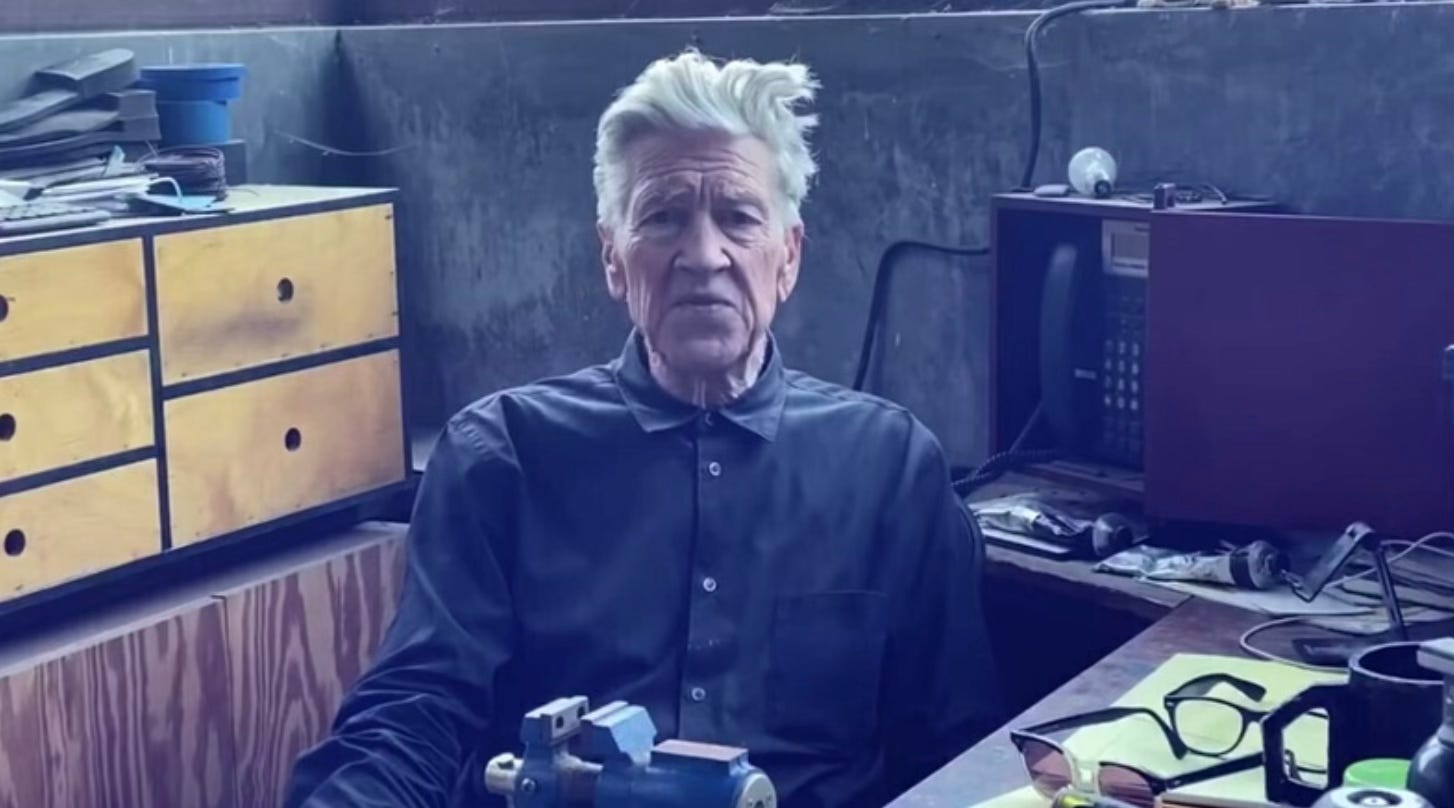‘Most people’s lives are filled with mystery, but things move super fast nowadays and there’s not much time to sit and daydream and notice the mystery’ ~ David Lynch
A note on the prompts & monthly depth writing pod
At the end of this dispatch you’ll find depth writing prompts to help you tap into your creativity & expand your sense of possibility. The prompts are invites that you can interpret in any way that feels right for you. You might want to do them now or when you have a quiet moment later on. You can do them on your own or with a friend. Or you can join the monthly depth writing pod on Monday February 17th 7pm - 8pm GMT to have time just for yourself to do the prompts online.
Free to paid subscribers - RSVP or use the zoom link in the footer to join the workshop
Not a paid subscriber but would like to join in? No problem book your place here
Write Your Undiscovered Self 5 week online course
If you’re interested in using writing and imagination to deepen creativity and support self-discovery and would like a light introduction to the pioneering psychology of Carl Jung, there are still a few places left on my upcoming course in association with The London Arts Based Research Centre, starting Monday March 3rd. Find out more here.
Read on or listen to the audio to explore:
The legacy of visionary film director & artist David Lynch
How they invite us to notice the mystery
The relationship between meditation, creativity & widening consciousness
Image: David Lynch Theatre/daily weather report, YouTube
Finding things underneath things
Sometime in the mid 1950’s on a sleepy, tree-lined street in Boise, Idaho, just as dusk was falling and the house lights were coming on, filling the dark with their warm, fuzzy glow, a young boy called David Keith Lynch was out playing with his brother.
It was the end of another ordinary day in small-town post-war America. And it might have stayed that way, had it not been for the naked woman, who appeared from out of the shadows, bleeding at the mouth and stumbling towards the confused boy, while looking straight through him.
Although the staggering woman was gone in an instant, in the imagination of visionary film maker and artist David Lynch, who died last month just shy of his 79th birthday, the rupture in the fabric of that summer night would remain in the iconic films and TV shows he would go on to make. As abused torch singer, Dorothy Vallens in Blue Velvet, dead prom queen Laura Palmer in Twin Peaks and amnesiac car crash survivor, Rita/Camilla Rhodes in Mulholland Drive - not forgetting the ghosts of Judy Garland and Marilyn Monroe, smoking cigarettes and swapping notes just behind the scenes.
I remember Twin Peaks when it first aired. The year was 1990. I was a brooding teenager, studying for exams and the question on everyone’s lips was: who killed Laura Palmer?
Every Tuesday at 9pm, I would tune in to watch Lynch’s groundbreaking murder mystery as, week by week, its twists and turns became darker and deeper than the rain-saturated redwoods surrounding the fictional town of Twin Peaks, closely guarding its secrets. I thought Lynch’s pioneering TV series was incredibly clever, disturbing and stylish, and still do.
But more than that, Twin Peaks aired at a point in my life when I was beginning to notice certain tears in the fabric both inside my own home and further afield, outside in the world.
The kitschy décor of the Palmer home, the claustrophobic wood panelling of the Salish Lodge Hotel, the creepy gothic of casino-cum-brothel, One-Eyed Jacks, the grind and whir of Packard’s Sawmill and the perpetual rain that set the mood for every episode held up a dark, highly polished mirror to deeply buried emotions I couldn’t really put words to.
What I didn’t understand then was the chilling accuracy with which the series’ trance-like darkness lifted a curtain on the dark trance of the American dream.
As Lynch says in his memoir Room to Dream, ‘some people open windows of houses but I like interiors and don’t care about windows. I like to go deeper into a house and find things underneath things.’
A magical street
Nor are the houses of Lynch’s films any old houses with any old rooms. They are multidimensional mazes of rooms within rooms within rooms and doors opening onto doors opening onto more doors where nothing and no one is what they first seem.
In this shadowy zone between recognisable reality and the paradoxical world of nightmares and dreams, innocent lovers become brutal killers; pathological sadists cry like babies and the frequencies on the radio chop and change between doom metal, be-bop and the swooning melancholia of composer Angelo Badalamenti. Meanwhile, in the densest, darkest corners of these hermetically sealed houses, dark wizard-like figures pull at invisible levers as the strange gives way to the even stranger.
This is particularly true, I think, of Lynch’s 2002 film Mulholland Drive. Ostensibly, an erotic Hollywood thriller involving sex, death, the movie business and a strange blue key, it has always remained an enigma to me.
The film begins in the pitch dark with a scene of Mulholland Drive at night and ends in the pitch dark with a death and the empty stage of the nightclub, Silencio.
I’ve pored over the characters’ jazz dance through the film’s logic-defying slips in time between these two mysteries, as their various masks slip, too, on more occasions than I can remember trying to figure out what Mulholland Drive is really about. Only to realise the film defies any single meaning or interpretation… and that’s the point.
If Mulholland Drive is about anything, to me, it’s a cinematic tone poem that’s suggestive of what Carl Jung calls ‘the densest darkness it is possible to imagine’ of the collective psyche - as the snaking möbius strip of Mulholland Drive itself seems to suggest. Indeed, Lynch has described the drive as ‘a magical street… many people feel that when they drive on it at night. It twists and turns and Hollywood is one side and the Valley is on the other and you kind of get lost on it. It’s an old road too, and there’s a mood to it.’
Like the more impenetrable aspects of our dreams, we can’t see into the centre of Lynch’s films, any more than we can see into the centre of a black hole. Nor are they without flaws. But there’s a mood to them and we can tune into their frequencies.
Blue skies all the way
Now, more than ever - at least in my lifetime - the darkness Lynch revealed in his films seems to be less and less hidden. One of the dangers of the darkness is that, if we are not careful, our cars can spin off this narrow möbius strip and we can be swallowed by it.
When Lynch’s death was announced, I felt a very real sense of loss. I think this was because it wasn’t just the prophetic vision of his films that had made such a deep impression on me but also the vitality and joy which he perennially seemed to radiate. And it’s this, I think, that elevates Lynch’s cinematic wizardry to great art that lives on in the heart.
As shot through with terror and violence as Lynch’s films are, they’re also comedies and love stories whose characters (good, bad and everything between) frequently burst into spontaneous song. The scene in Wild at Heart when lovers-on-the-run, Lula and Sailor, pull up on the side of the road and let rip to thrash-metal in a wheat field makes me want to jump up and dance, too. Then there’s the closing shot of Blue Velvet, which came to Lynch in a dream, where a cheerful Dorothy Vallens - free at last from her sadistic torturer, Frank - laughs in delight at the robin who has appeared at her window, cocking its head and eating a bug.
A life-long practitioner of Transcendental Meditation, it seems to me that Lynch was able to see the inner light in the darkest of places precisely because he had cultivated such a strong inner light himself. I imagine Lynch sitting crossed legged on another plane right now, wearing an immaculately pressed suit, hands resting gently in lap, tuning into the frequencies and noticing the mystery, a smiling Buddha with the bouncing quiff of Elvis.
While I was thinking about how to end this piece I went for a walk on the hillside overlooking my valley. The sun was out, the fields were shining with a light frost and the daily weather reports which Lynch made throughout the pandemic in his inimitable style, weaving the banal and sublime, came to mind. As they did, these words from one of his reports floated into my head:
‘Keep your eye on the doughnut and not on the hole. It’s a beautiful day with golden sunshine and blue skies all the way.’
Lets discuss in the comments below
What’s your favourite David Lynch film and why?
What practices & teachings help you ‘notice the mystery’?
Depth writing prompts
Meditate, focusing on your breath for as long as you feel comfortable, or any style of mediation that works for you, then write freely, going with what comes up until you’re ready to stop.
Write a response to the above words from Lynch’s daily weather report. Or write your own daily weather reports.
Write about an ordinary, everyday event or scene as if it’s a dream. And/or take images and figures from a dream and turn them into a story. What unexpected elements and twists can you add to introduce humour and light? Perhaps it becomes the opening scene of a mystery?
Join the monthly Depth-Writing Pod on Monday February 17th, 7pm - 8pm GMT
Do the films of David Lynch and the themes of mystery, what’s hidden, meditation and developing tools to negotiate the darkness resonate with you? If so, you can join the monthly online depth writing pod on Monday February 17th 7-8pm GMT to do them together with others.
These monthly pods are opportunity to press pause on the busyness of life and have time just for yourself to write in response to this month’s prompts. This monthly pod will include a short introduction and approximately 40-45 minutes writing time.
Who is the pod for?
Writers and creative practitioners who would like to expand their practice
Therapeutic practitioners who would like to extend their range
Those interested in deepening creativity and self-discovery through writing
Paid subscribers - RSVP to this email or join via the zoom link in the footer below.
Free subscribers book your place here
Although depth-writing is a transformational practice, it’s not therapy, so let the words lead but only as far as want to go.
By joining the monthly pod, you are agreeing to practice CARE - confidentiality, attention, respect & empathy - with others.
Got a question or want to say hi? I love hearing from readers so if you want to get in touch, just reply to this email or send me a message.













Share this post